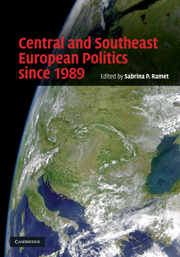Book contents
- Frontmatter
- Contents
- List of figures and maps
- List of tables
- Notes on the contributors
- Preface
- List of acronyms and abbreviations
- Guide to pronunciation of Central and Southeast European words
- 1 Central and Southeastern Europe, 1989
- 2 Central and Southeastern Europe, 2009
- Part 1 Introduction
- Part 2 Issues
- Part 3 Central Europe
- Part 4 Yugoslav Successor States
- Part 5 Southeastern Europe
- 17 Romania: in the shadow of the past
- 18 Bulgaria since 1989
- 19 Albania since 1989: the Hoxhaist legacy
- Part 6 Former Soviet republics
- Part 7 Present and future challenges
- Index
- References
18 - Bulgaria since 1989
Published online by Cambridge University Press: 05 June 2012
- Frontmatter
- Contents
- List of figures and maps
- List of tables
- Notes on the contributors
- Preface
- List of acronyms and abbreviations
- Guide to pronunciation of Central and Southeast European words
- 1 Central and Southeastern Europe, 1989
- 2 Central and Southeastern Europe, 2009
- Part 1 Introduction
- Part 2 Issues
- Part 3 Central Europe
- Part 4 Yugoslav Successor States
- Part 5 Southeastern Europe
- 17 Romania: in the shadow of the past
- 18 Bulgaria since 1989
- 19 Albania since 1989: the Hoxhaist legacy
- Part 6 Former Soviet republics
- Part 7 Present and future challenges
- Index
- References
Summary
As a small Balkan country on the edge of the European continent, Bulgaria attracts little international attention. It has not seen any of the violent conflicts that have troubled most of the rest of Southeastern Europe, nor has it been among the best political and economic performers in the region during the post-communist era. Nonetheless, in 2007, Bulgaria is substantially different from the Soviet satellite it was in 1989. Today, the country is a member of both NATO and the EU, and has a stable democracy and a functioning market economy.
But if Bulgaria's transition from one-party communist rule to a multi party political system was not violent, the country had difficulty in adjusting to the challenges of a free-market economic system, most of which were the result of its recent history. Prior to 1989, the country was characterized by prolonged periods of foreign domination, dependence on its trading partners in the Soviet bloc, and several non-democratic regimes, with only brief periods of democratic development. Consequently, when the political system opened up to allow for the establishment of democratic values and institutions, Bulgaria experienced numerous, and often daunting, challenges in reforming or replacing its existing political, economic, and social systems.
Despite these difficulties, the transformation of the country since 1989 has been impressive. Bulgaria's transformation consisted of three distinct, but often interrelated, processes: the dismantling of the pre-1990 one-party state, the establishment of a multiparty democracy, liberal society, and a market economy; and the gradual adoption of European norms, policies, and practices.
- Type
- Chapter
- Information
- Central and Southeast European Politics since 1989 , pp. 401 - 420Publisher: Cambridge University PressPrint publication year: 2010
References
- 2
- Cited by



